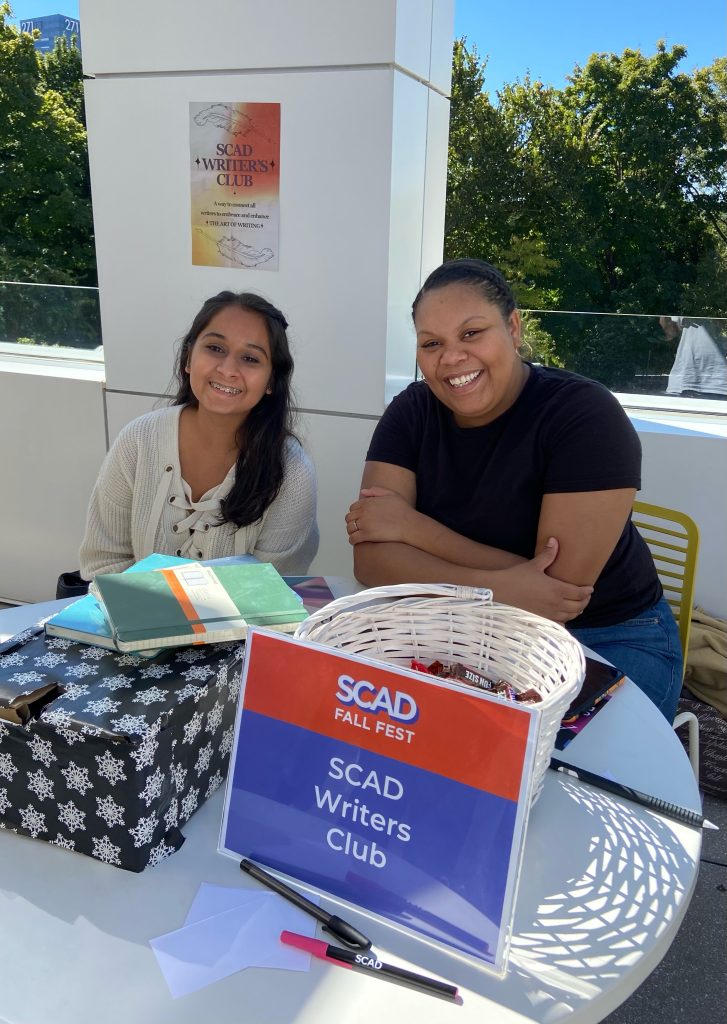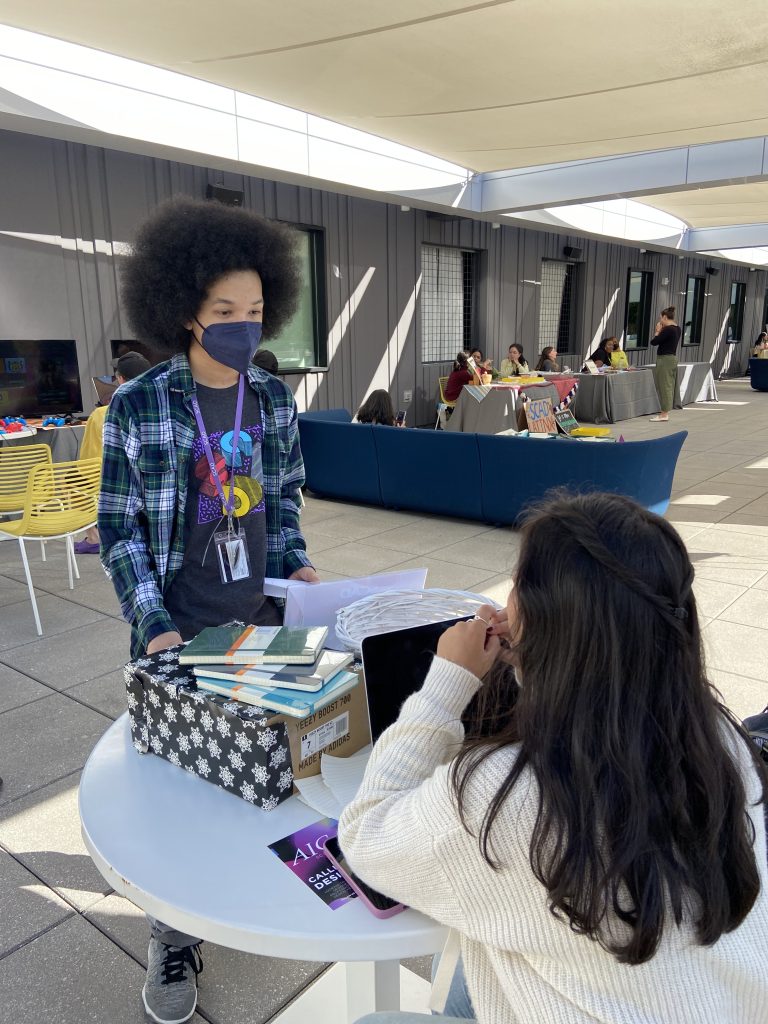Write On: A new chapter of the SCAD Writer’s Club

Prior to the COVID-19 outbreak, the Writer’s Club here at SCAD Atlanta existed as a community for non-writing majors to bond over this underrated creative outlet. However, with the rise of sudden quarantines and Zoom classrooms came the death of the SCAD Writer’s Club as we knew it. All of the club’s original officers graduated virtually before having the opportunity to revamp it on campus. But luckily, a very devoted group of SCAD writing majors have stepped forward to bring the beloved Writer’s Club back to life.
“Back in the spring, one of my classes was having a group discussion about the writer’s program in general, and how it’s shifted post-COVID,” says junior writing student Vrishti Savalani, an international SCAD student from Hong Kong. “Everything’s become a bit more spread out since then, and we were talking about trying to find a way to bring everyone back together and regain that sense of community.”
At that point, Savalani had only taken a few writing classes, meaning that she’d only met a handful of other writing students. But it didn’t take her long to realize that although the writing program keeps grasping for another handful, there just aren’t enough writing students to provide one.
“Writing is such a small major here at SCAD, and it’s starting to feel like it’s getting smaller in a sense,” Savalani says. “During that class discussion, Eva [Erhardt], another writing major, suggested restarting the Writer’s Club. But since she already has a lot on her plate (as editor-in-chief of both The Connector and SCAN Magazine), I offered to take that initiative to bring more of us writers together.”
Savalani set the Writer’s Club in motion by becoming its president, while Erhardt remained involved in the club as its vice president. However, Writer’s Club secretary Amara Holland joined the team with a completely different approach.
“Last winter, I needed an elective, so I took Professor Bundy’s creative nonfiction class,” says Holland, a senior advertising and branding student with a concentration in art direction. “I wrote a lot of poems and short stories when I was young, but taking that class really made me fall in love with writing, and it quickly became something that I was very passionate about.” Shortly afterward, Holland changed her minor from business to creative writing.
From there, Holland took a few other writing classes and got to know more familiar faces in the program. “When Vrishti [Savalani] brought up the Writer’s Club to me, I offered to get involved as one of the executive officers,” Holland says. “I mean, why not? It seemed like a great way to stay involved with the friends I met through the writing program.”
Although Holland currently serves as the club’s secretary, she’s helped a lot with the behind-the-scenes aspects of the Writer’s Club, even before the roles were established. “Amara’s branched into other areas of the Writer’s Club as well, and she’s really been my right-hand man throughout this entire process,” says Savalani.

Now that the Writer’s Club is officially up and running, it has seen a surprising turnout between its interest meeting last month and its appearance at last week’s Fall Fest, hosted by SCAD Atlanta Student Involvement. “I think we already have at least sixty people on our list at the moment,” says Holland. “I’m shocked, but I’m excited.”
When asked what new members can expect from the Writer’s Club this year, Savalani says that the Writer’s Club is planning some upcoming seasonal events, such as a spooky storytelling session for Halloween and a Secret Santa book swap around Christmastime.
But more importantly, Savalani’s primary focus is on building relationships within the club. “Ideally, if things go according to plan, we want to cater more towards recruiting new faces and creating that bond and social structure, for this quarter at least,” she says. “We need to focus on the community aspect of the club before we can focus on the writing aspect of it.”
With that being said, the community aspect of a solid writer’s group is more important than one might think. The Writer’s Club wants to emphasize that its doors are open to students of all majors, and that it’s not just limited to the rare breed of writing majors here at SCAD.
“I’ve found that a lot of students have a background in writing, but they don’t really have the opportunity to explore their passion for it,” says Savalani. “We want to bring together a community of storytellers, regardless of what kind of story it is that you’re telling. We want to give people that chance to fall in love with their passion.”
According to a conversation that Savalani had with one of her writing professors, the pre-COVID chapter of the SCAD Writer’s Club got to a point where there were no writing majors on its members list at all. “It was just because they were so interested in writing as an art form, even if it wasn’t their major,” Savalani says. She hopes to continue that interest among the SCAD community, while still giving writing majors the opportunity to offer their guidance as well.
“Writers are often forgotten here at SCAD despite being the backbone of every major,” says Eva Erhardt, Vice President of the Writer’s Club. “With this club, we hope to get more recognition for the people in the writing department and the incredible work that they produce. Just because [writing students] aren’t as front facing as film, fashion, or animation, it doesn’t mean that we’re not here and thriving.”
However, while the writing program seems like an urban myth among most SCAD students, that’s not to say that writing should be taken any less seriously as a creative profession. “One thing that people forget is that writing is an art form,” says Holland. “People are always so confused that there’s a writing program at our art school, but it really is a creative outlet for so many people.”
Holland also says that she looks for a lot of “closeted writers” at SCAD, meaning that she seeks students that want to write, but don’t really know how to start. “I think that the Writer’s Club can be a great outlet for closeted writers,” she says. “I meet so many people that sometimes like to write, and maybe that’s because some people are just a little afraid to take that leap. But I want to give those people that chance to learn that they can love writing all the time.”
“Writing is one of the most important skills that someone can learn and hopefully love,” says Erhardt. “It makes for a more intelligent, empathetic and creative society when the general population has a serious appreciation for literature and writing as a whole.”
“Even if you don’t think that your major has to do with the skill, we can assure you that it does,” Erhardt adds. “Everything comes back to storytelling. By being in this club, you’re surrounded by the strongest storytellers at SCAD, and we hope that students find inspiration in that aspect.”

When asked if they have any advice for aspiring writers, the team behind the Writer’s Club encourages a combination of preparation and practice.
“My advice is to start by writing everything down,” says Holland. “Any time that you’re in a specific moment — you see something, or you experience something — write it down. It could be as simple as seeing someone in an interesting outfit walk past or sharing a funny moment with a loved one. Just take note of it, because it could turn into something that you could create a story about.”
Erhardt, on the other hand, encourages aspiring writers to read. “Reading is one of the best and most inexpensive ways to learn how to write,” she says. “Someone once told me that he didn’t read [as a writer] because he didn’t want it to change his voice, but I feel the opposite. Your written voice is built from the literature and media you consume. Why not influence yourself with beautiful works instead?”
“I think the thing that most writers get caught up in is wanting their writing to be perfect,” says Savalani. “As a Virgo, I do that a lot. I want it to be perfect before I’ve even written anything down. But I’ve learned that you aren’t going to get anything done by just thinking about how perfect your writing could be, because you’re constantly stopping yourself before you start. Create a vomit draft if you have to, but the key is to write. Just write.”
Most importantly, the Writer’s Club agrees that the best advice is to get involved with the writing community here at SCAD, whether you’re a writing major or not.
The first Writer’s Club meeting will be held virtually on Friday, October 14. If you’re interested in attending, getting involved with other Writer’s Club events or just meeting more like-minded creative writers, give their page a follow on Instagram, or shoot vsaval21@student.scad.edu an email to sign up.





















